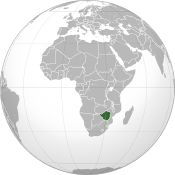Zimbabwe: Robert Mugabe resigns presidency after military coup, threat of impeachment
Thursday, November 23, 2017

Image: Press Service of the President of Russia.
On Tuesday, Zimbabwe President Robert Mugabe resigned, after ruling Zimbabwe for 37 years, in the wake of a military coup following his ouster of Vice President Emmerson Mnangagwa and shortly after the start of an impeachment hearing against him. His letter of resignation was read in parliament and reports indicate the ruling ZANU–PF party is to appoint Mnangagwa in his place.
Mugabe had been president since the Patriotic Front, predecessor of ZANU-PF, won elections against the white minority administration of the former Rhodesia in 1980; with Joshua Nkomo, he had led the guerilla war for control of the country by the black majority, and returned from exile weeks before the vote. The oldest of the world's leaders at 93, he dismissed Mnangagwa earlier this month, in what was reportedly widely believed to be a plan to secure the succession for his 52-year-old wife, Grace Mugabe. This aroused the anger of both the party and the army, who placed him under house arrest on November 14 and launched a coup the following day. One week later, after he failed to resign, parliament began impeachment proceedings against him. He then submitted his letter of resignation.
Celebrations broke out in parliament and in the streets of the capital, Harare, where the Christmas lights in Africa Unity Square were turned on ahead of schedule. Mugabe's political opposition described him as a tyrant.
Constitutionally, Phelekezela Mphoko, who succeeded Mnangagwa as vice president, would succeed Mugabe as president. However, Lovemore Matuke, chief whip of ZANU-PF, in remarks to Reuters said Mnangagwa would succeed Mugabe instead. On Wednesday, Mnangagwa returned from exile in South Africa and gave a speech in which he declared: "Today we are witnessing the beginning of a new and unfolding democracy." The next general election is required to be held by next September.
Sources
- Jason Burke and Emma Graham-Harrison. "Emmerson Mnangagwa hails 'new democracy' in Zimbabwe" — The Guardian, November 22, 2017
- "Zimbabwe: Mysteries remain about Mugabe's downfall" — BBC News, November 22, 2017
- "Mugabe's long career in pictures" — BBC News, November 21, 2017
- "Mugabe resigns: Zimbabwe celebrates end of an era" — BBC News, November 20, 2017
- MacDonald Dzirutwe. "Zimbabwe's Mugabe resigns, ending four decades of rule" — Reuters, November 20, 2017

